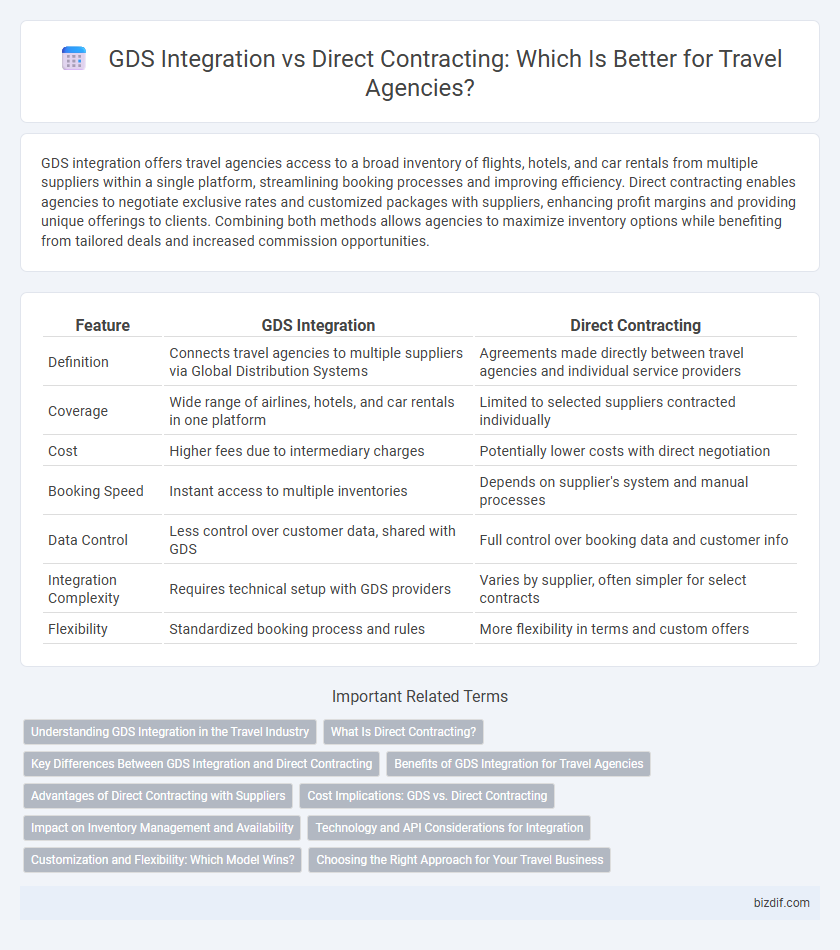GDS integration offers travel agencies access to a broad inventory of flights, hotels, and car rentals from multiple suppliers within a single platform, streamlining booking processes and improving efficiency. Direct contracting enables agencies to negotiate exclusive rates and customized packages with suppliers, enhancing profit margins and providing unique offerings to clients. Combining both methods allows agencies to maximize inventory options while benefiting from tailored deals and increased commission opportunities.
Table of Comparison
| Feature | GDS Integration | Direct Contracting |
|---|---|---|
| Definition | Connects travel agencies to multiple suppliers via Global Distribution Systems | Agreements made directly between travel agencies and individual service providers |
| Coverage | Wide range of airlines, hotels, and car rentals in one platform | Limited to selected suppliers contracted individually |
| Cost | Higher fees due to intermediary charges | Potentially lower costs with direct negotiation |
| Booking Speed | Instant access to multiple inventories | Depends on supplier's system and manual processes |
| Data Control | Less control over customer data, shared with GDS | Full control over booking data and customer info |
| Integration Complexity | Requires technical setup with GDS providers | Varies by supplier, often simpler for select contracts |
| Flexibility | Standardized booking process and rules | More flexibility in terms and custom offers |
Understanding GDS Integration in the Travel Industry
GDS integration in the travel industry enables agencies to access aggregate inventory from multiple suppliers through a single platform, improving booking efficiency and real-time availability. This system connects travel agents directly to airline, hotel, and car rental databases, streamlining reservations and facilitating comprehensive itinerary management. Understanding GDS integration helps travel agencies enhance operational workflows and offer competitive pricing by leveraging dynamic content from diverse travel providers.
What Is Direct Contracting?
Direct contracting in the travel industry refers to establishing agreements directly with hotels, airlines, or service providers, bypassing third-party Global Distribution Systems (GDS). This approach allows travel agencies to access exclusive rates, customized inventory, and personalized terms, often resulting in cost savings and improved profit margins. By leveraging direct contracts, agencies can enhance booking flexibility and deliver tailored travel experiences that are not always available through GDS platforms.
Key Differences Between GDS Integration and Direct Contracting
GDS integration offers travel agencies real-time access to multiple suppliers' inventories through a centralized platform, enhancing efficiency and broadening offerings. Direct contracting involves establishing exclusive agreements with individual suppliers, allowing for tailored rates and personalized service but requiring more management resources. Key differences include scope of access, operational control, and cost structure, with GDS integration providing wider reach and direct contracting enabling customized partnerships.
Benefits of GDS Integration for Travel Agencies
GDS integration streamlines access to a vast network of airlines, hotels, and car rental services, enabling travel agencies to offer comprehensive and real-time inventory with competitive pricing. It enhances booking accuracy and reduces manual errors through automated updates and centralized management. Travel agencies benefit from increased efficiency, expanded product offerings, and improved customer satisfaction by leveraging the robust connectivity and standardized data formats provided by major GDS platforms such as Amadeus, Sabre, and Travelport.
Advantages of Direct Contracting with Suppliers
Direct contracting with suppliers offers travel agencies enhanced access to exclusive rates and personalized inventory unavailable through GDS systems. Agencies benefit from stronger supplier relationships, enabling tailored packages and flexible booking conditions that improve customer satisfaction. This approach reduces reliance on intermediary platforms, resulting in lower commission fees and increased profit margins.
Cost Implications: GDS vs. Direct Contracting
GDS integration typically involves ongoing fees, including transaction charges and subscription costs, which can accumulate significantly for travel agencies processing high volumes of bookings. Direct contracting with suppliers often reduces these fees, enabling agencies to negotiate tailored commission rates and secure better net rates, ultimately lowering overall operational expenses. However, direct contracting requires more administrative effort and may limit access to diverse inventory compared to the broad offerings available through GDS platforms.
Impact on Inventory Management and Availability
GDS integration centralizes inventory management, enabling real-time access to multiple suppliers' availability through a single platform, which enhances booking efficiency and reduces the likelihood of overbooking. Direct contracting offers more control over exclusive inventory and pricing but requires manual updates and system synchronization to maintain accurate availability, increasing administrative workload. Balancing GDS integration with selective direct contracts optimizes both comprehensive inventory access and tailored offerings for travel agencies.
Technology and API Considerations for Integration
GDS integration offers a standardized API framework that enables seamless access to multiple suppliers and global inventory through a single connection, streamlining data exchange and booking processes. Direct contracting requires custom API development tailored to each supplier's platform, resulting in higher complexity and maintenance efforts but allowing for greater control over pricing and exclusive deals. Technology considerations include API compatibility, data synchronization frequency, and error handling to ensure reliable, real-time reservations and up-to-date availability.
Customization and Flexibility: Which Model Wins?
Direct contracting offers superior customization and flexibility by allowing travel agencies to negotiate tailored rates, unique inventory access, and personalized service agreements directly with suppliers. GDS integration provides standardized content that simplifies access to a broad range of suppliers but often limits the ability to customize offerings or implement bespoke pricing strategies. For agencies prioritizing adaptable solutions and exclusive deals, direct contracting typically delivers the most dynamic, flexible model.
Choosing the Right Approach for Your Travel Business
GDS integration offers travel agencies access to a vast inventory of flights, hotels, and car rentals from multiple suppliers through a single platform, enhancing efficiency and real-time availability. Direct contracting enables personalized agreements with specific suppliers, often resulting in exclusive rates, tailored services, and better profit margins for niche markets. Choosing the right approach depends on your business model, target audience, and operational needs, balancing broad access with customized deals to maximize revenue and client satisfaction.
GDS integration vs Direct contracting Infographic

 bizdif.com
bizdif.com